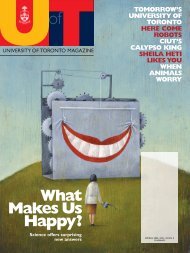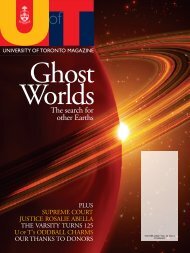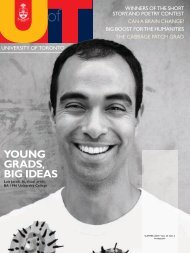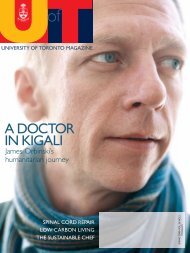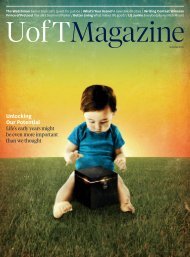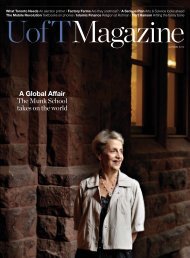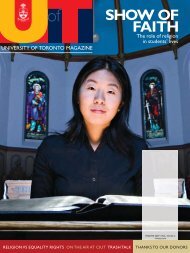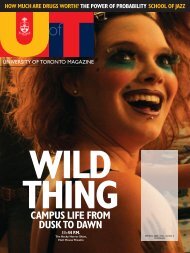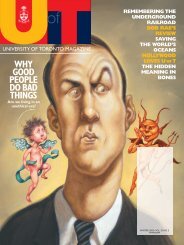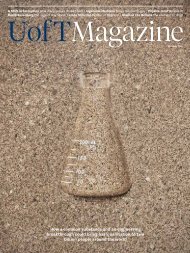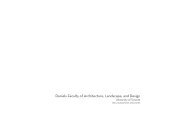The Next Big Idea 10 concepts that could - University of Toronto ...
The Next Big Idea 10 concepts that could - University of Toronto ...
The Next Big Idea 10 concepts that could - University of Toronto ...
You also want an ePaper? Increase the reach of your titles
YUMPU automatically turns print PDFs into web optimized ePapers that Google loves.
will naturally predominate in a given school. But the teachers<br />
and curriculum are not reflecting these changing circumstances,<br />
and <strong>that</strong>’s what Spence aims to correct.<br />
“It’s not segregation, it’s salvation,” he says. (Catchy slogans<br />
are <strong>of</strong>ten the glue Spence uses to get his messages to stick.)<br />
“Getting an opportunity to be in an environment <strong>that</strong> reflects<br />
who they are is salvation for many kids who end up not even<br />
dropping out, but being pushed out because they don’t fit the<br />
status quo.”<br />
Spence thinks he might be able to stem the flight from<br />
public schools by giving parents more choice in how their<br />
children are educated. He would like to see four new specialized<br />
schools open in 2011, adding to the 41 (out <strong>of</strong> 557 schools<br />
in the <strong>Toronto</strong> board) <strong>that</strong> already exist. <strong>The</strong> new schools will<br />
concentrate on choir and sports, as well as unisex education.<br />
“One size doesn’t fit all,” says Spence. “We’re going to try to<br />
provide opportunities so <strong>that</strong> parents and their children can<br />
sit down and say here’s what we want in terms <strong>of</strong> a learning<br />
environment, and where can we get it”<br />
Many <strong>of</strong> these choices were available long before Spence<br />
came along. French immersion, the granddaddy <strong>of</strong> boutique<br />
schooling, has been around for more than 40 years. But the<br />
<strong>Toronto</strong> <strong>of</strong> today <strong>of</strong>fers vastly more: there are schools <strong>that</strong><br />
concentrate on the arts, on math and science, on social justice<br />
and the environment. <strong>The</strong>re is a school specifically for gay<br />
teenagers, and one for single parents. One school holds kindergarten<br />
classes outdoors when possible, and others are<br />
unstructured, without tests or homework.<br />
Most controversial, perhaps, are the schools tailored to<br />
student ethnicity, such as the east end’s First Nations School,<br />
or the much-discussed Africentric Alternative School. For<br />
some, such schools revive the ugly spectre <strong>of</strong> segregation,<br />
exactly the sort <strong>of</strong> menace the U.S. mercifully struck down<br />
with Brown vs. the Board <strong>of</strong> Education in the 1950s. “I don’t<br />
think it’s a good idea,” said Ontario Premier Dalton McGuinty<br />
when the idea <strong>of</strong> an Africentric school was first proposed. “I<br />
think our shared responsibility is to look for ways to bring<br />
people together. One <strong>of</strong> the most powerful agents <strong>of</strong> social<br />
cohesion is through publicly funded education.”<br />
But total cohesion may be something <strong>of</strong> a pipe dream, says<br />
Spence. “I think we are very much segregated, based on socioeconomics.<br />
It’s happening already!” he exclaims. In <strong>Toronto</strong>,<br />
seven out <strong>of</strong> <strong>10</strong> students belong to visible minority groups –<br />
and since the city is carved into ethnic enclaves, certain groups<br />
Spence “wouldn’t change a thing” about his own<br />
upbringing, but he clearly knows what it’s like<br />
to feel alienated in school. Born in England in<br />
1962, he immigrated seven years later with his<br />
parents and siblings to Windsor, Ontario. <strong>The</strong>re,<br />
as one <strong>of</strong> very few black students in his school, he was bullied<br />
routinely. “I didn’t want to come to school,” he says. “<strong>The</strong>re<br />
were guys there who were going to try and take my lunch and<br />
make me feel like I didn’t belong.” Still, attentive pr<strong>of</strong>essional<br />
parents (his mother was a nurse, his father an engineer) and<br />
good relationships with teachers helped him to prosper.<br />
He has joked <strong>that</strong> running from bullies helped him develop<br />
athletic talents. In the 1980s, he played two seasons as running<br />
back for the B.C. Lions before injury propelled him back<br />
to school. After earning a degree in criminology, he started<br />
working with juvenile <strong>of</strong>fenders. “It was just really demoralizing,”<br />
he says <strong>of</strong> <strong>that</strong> time. “I thought, I want to get to these<br />
kids before they end up here. Because when they do, it’s almost<br />
like society’s given up on them. So <strong>that</strong> was the contribution<br />
<strong>that</strong> I was going to make: I wanted to make sure kids didn’t<br />
end up in those circumstances.”<br />
In 1996, he earned a doctorate from the Ontario Institute<br />
for Studies in Education and decided to apply his knowledge<br />
as a teacher – then middle-school principal – in one <strong>of</strong> <strong>Toronto</strong>’s<br />
lower-income neighbourhoods. This last experience informed<br />
the second <strong>of</strong> his four books, entitled On Time! On Task! On a<br />
Mission! It diarizes the 1998-1999 school year at Lawrence<br />
Heights Middle School, a place where students were given to<br />
hurling library books out the window, mooning teachers,<br />
defacing property and worse. A place where one student told<br />
him, “It doesn’t matter what you guys do. By the time I’m 16<br />
I’m going to end up in jail.”<br />
With a vigorous program <strong>of</strong> changes, including school<br />
uniforms, summer camp and Saturday schooling, Spence was<br />
able to instil hope in many <strong>of</strong> these young adolescents. It’s<br />
something he’d been doing for a while. While teaching in<br />
36 WWW.MAGAZINE.UTORONTO.CA



